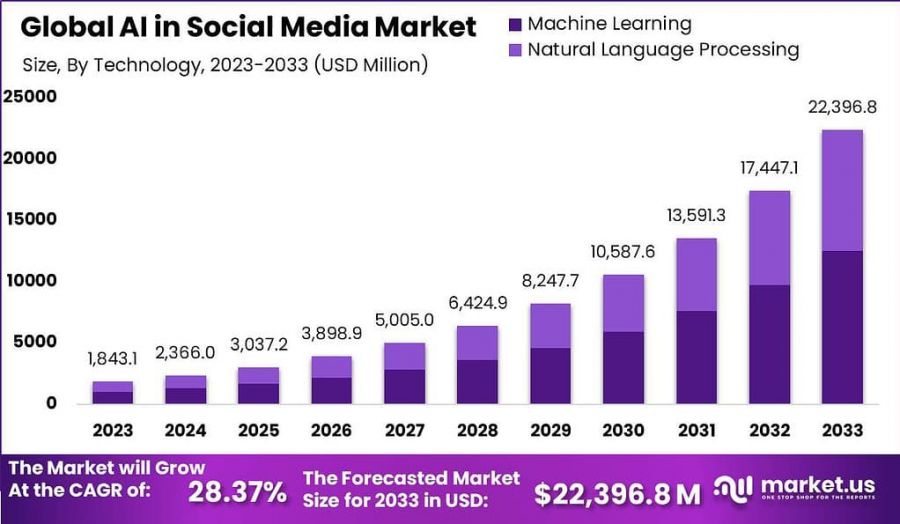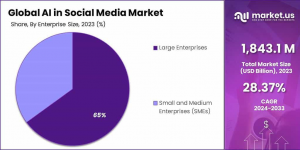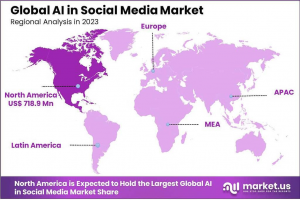
AI in Social Media Market Boost Creators by Revenue of USD 22,396.8 Million by 2033
The AI in Social Media Market is projected to reach USD 22,396.8 million by 2033, growing from USD 1,843.1 million in 2023, at a CAGR of 28.37%.
NEW YORK, NY, UNITED STATES, January 22, 2025 /EINPresswire.com/ -- The Global AI in Social Media Market is anticipated to grow significantly, reaching USD 22,396.8 million by 2033, up from USD 1,843.1 million in 2023. This represents a strong CAGR of 28.37% during the forecast period from 2024 to 2033. The growth is driven by the increasing use of artificial intelligence to optimize content creation, enhance user experiences, and automate customer interactions on social media platforms. AI technologies such as machine learning, natural language processing, and image recognition are transforming how brands engage with consumers, offering new opportunities for targeted advertising, sentiment analysis, and real-time insights.
The AI in Social Media Market is experiencing rapid growth, driven by several key factors. First, the increasing adoption of artificial intelligence by social media platforms for content creation, personalized recommendations, and customer engagement is a significant growth driver. AI enables businesses to automate repetitive tasks, enhance customer service through chatbots, and improve ad targeting through predictive analytics, creating a more tailored user experience. As social media platforms collect vast amounts of data, AI technologies such as machine learning and natural language processing are used to analyze user behavior, offering actionable insights to marketers.
Technological advancements in AI are reshaping market trends, particularly in areas like automated content creation, sentiment analysis, and image recognition. Social media platforms are increasingly integrating these technologies to improve user engagement and streamline operations. The market demand for AI-powered tools continues to rise as businesses aim to stay competitive by leveraging AI to drive more personalized and relevant interactions with users.
Additionally, the growth of influencer marketing, video content, and live streaming is influencing AI-driven innovations in content production and curation. As these trends gain momentum, AI’s role in optimizing content visibility, improving targeting algorithms, and automating content moderation becomes increasingly crucial. These technological advancements and market shifts are positioning AI as a key component in the future of social media.
Get Research Sample Here @ https://market.us/report/ai-in-social-media-market/request-sample/
Key Statistics
Global expenditure on social media advertising, bolstered by AI-powered targeting techniques, is expected to surge to around $105 billion by 2024, up from an estimated $82 billion in 2022. This growth highlights the increasing reliance on AI to enhance ad relevance through advanced data analysis, optimizing return on investment (ROI) for advertisers. AI’s ability to deliver personalized ads at scale enables brands to more effectively engage their target audience, significantly improving the efficiency of their advertising efforts.
By 2024, it is projected that over 30% of social media content generated by brands will be created using AI technologies, a notable increase from less than 10% in 2022. This growth is indicative of brands’ growing dependency on AI to craft engaging, dynamic, and personalized content at scale, allowing them to maintain an active and relevant presence across social media platforms.
Social media platforms are also adopting Natural Language Processing (NLP) and emotional AI technologies to detect and manage harmful content more effectively. By 2024, these technologies are expected to achieve over 90% accuracy in identifying undesirable content, significantly enhancing the safety and integrity of online communities.
AI-powered chatbots are also becoming increasingly prevalent in facilitating brand engagements, with these tools projected to handle 25% of interactions by 2024, a significant jump from less than 5% in 2022. This shift underscores the effectiveness of chatbots in providing personalized, real-time customer support and improving user experiences.
The integration of AI in social media analytics tools is anticipated to exceed 70% by 2024. This growth will enable marketers to better understand their audience, optimize campaigns, and drive more precise targeting. Additionally, the value of computer vision AI in analyzing social media visual content is expected to reach $2 billion by 2024, emphasizing the rising importance of visual data. AI advancements will also play a pivotal role in detecting deepfakes and synthetic media, with accuracy expected to surpass 93% by 2024, helping preserve the authenticity and trust of shared content.
Key takeaways
- The AI in Social Media Market is expected to reach USD 22,396.8 million by 2033, growing at a CAGR of 28.37% during the forecast period.
- Global expenditure on social media advertising, enhanced by AI targeting techniques, is projected to reach USD 105 billion by 2024, improving ad relevance through advanced data analysis and boosting return on investment for advertisers.
- The role of AI chatbots in social branded engagements is expected to grow significantly, accounting for 25% of such interactions by 2024, delivering personalized customer experiences at scale.
- In 2023, the Machine Learning segment led the market, capturing over 56% of the AI in Social Media market share.
- The Sales & Marketing segment held more than 32% of the market share in 2023, highlighting the growing role of AI in targeted campaigns and customer insights.
- Large Enterprises dominated the market in 2023, capturing more than 65% of the share, as they are the primary adopters of AI tools for digital transformation and efficiency.
- The Retail and E-Commerce segment accounted for over 28% of the market in 2023, reflecting the widespread use of AI to enhance customer experience and drive online sales.
Analysts Viewpoint
The AI in Social Media Market is experiencing robust growth, driven by government incentives and technological innovations. Governments worldwide are recognizing the value of AI in enhancing digital economies and are providing funding for AI research, infrastructure development, and training programs. These incentives are propelling the adoption of AI tools in social media, enabling platforms to offer smarter advertising, content personalization, and customer service solutions.
Investment opportunities are abundant, particularly in AI-driven solutions for advertising, content creation, and social engagement. However, risks include concerns over data privacy, security issues, and the ethical implications of AI-generated content, which could hinder broader market adoption. As AI algorithms grow more powerful, consumer awareness of data collection and usage will drive the demand for more transparent and ethical AI practices.
The technological impact of AI on social media is transformative, allowing platforms to provide highly personalized user experiences and improve operational efficiency. This shift is especially evident in the growing use of AI chatbots and machine learning for content and audience engagement.
The regulatory environment is evolving rapidly, with governments introducing policies to ensure the ethical use of AI technologies, including data protection laws and content moderation standards. Companies will need to navigate this complex regulatory landscape to ensure compliance and maintain consumer trust. As the market matures, staying aligned with regulatory requirements and ethical standards will be crucial for long-term success.
Get the Detailed Report at Exclusive Discount @ https://market.us/purchase-report/?report_id=65623
Report Segmentation
The AI in Social Media Market report is segmented into several key sections for a comprehensive analysis. It begins with an introduction, providing an overview of AI’s role in social media, the scope of the report, and the methodology used for research. The market dynamics section covers the driving factors such as technological innovations, government incentives, and increasing demand for personalized content.
It also addresses restraints, including data privacy concerns, security challenges, and ethical issues related to AI-generated content. Opportunities like rising consumer awareness and the growing demand for automated customer service are explored, alongside challenges in navigating regulatory frameworks and addressing biases in AI models.
The technology segmentation section delves into key AI technologies such as machine learning, natural language processing (NLP), computer vision, and AI chatbots. The market segmentation by application discusses areas like advertising and marketing, customer engagement, and content creation. It also looks at end-users, including large enterprises, SMEs, and consumers/content creators. The geographical analysis section provides insights into regional markets, covering North America, Europe, Asia-Pacific, Latin America, and the Middle East and Africa.
Further, the competitive landscape evaluates the key players, their market strategies, and recent technological developments. The report concludes with an analysis of the regulatory and legal environment, focusing on data protection laws and government policies regarding AI content regulation.
Key Market Segments
- By Technology
-- Machine Learning and Deep Learning
-- Natural Language Processing (NLP)
- By Application
-- Sales and Marketing
-- Customer Experience Management
-- Predictive Risk Assessment
-- Image recognition
- By Enterprise Size
-- Large Enterprises
-- Small and Medium Enterprises (SMEs)
- By Industry Vertical
-- BFSI
-- IT and Telecom
-- Retail and E-Commerce
-- Media and Advertisement
-- Education
-- Others
Drivers
The AI in Social Media Market is primarily driven by several key factors. First, the increasing adoption of artificial intelligence in social media platforms is enhancing personalization and engagement. AI algorithms help tailor content, advertisements, and recommendations to individual user preferences, driving more relevant interactions. Additionally, the demand for automated customer service solutions like AI chatbots is growing, as businesses seek to improve customer support while reducing costs.
Government incentives and investments in AI technology are also fueling market growth, with initiatives aimed at advancing AI research and improving digital infrastructure. The expansion of smart devices and IoT is increasing the amount of data available to AI systems, which enables better targeting and audience segmentation. These factors collectively contribute to the growth of AI adoption in social media, making it an integral part of the digital landscape.
Restraints
Despite its growth, the AI in social media market faces some restraining factors. Data privacy concerns are a significant issue, as social media platforms collect vast amounts of personal data to fuel AI algorithms. There is growing public concern about how this data is used and whether it is adequately protected from breaches.
Additionally, ethical issues surrounding the use of AI to generate content or moderate discussions are a challenge, as AI can unintentionally promote biased or harmful content. Regulatory hurdles, such as data protection laws like GDPR, complicate the deployment of AI technologies in social media. These issues could slow down AI integration and limit its potential.
Challenges
A major challenge for the AI in social media market is ensuring accuracy and quality in content generated by AI systems. As AI models become more advanced, maintaining high standards of relevance, context, and engagement in automated content is increasingly difficult.
Additionally, AI bias remains a concern, as algorithms may perpetuate existing biases found in training data, leading to unfair or discriminatory outcomes. This makes transparency in AI processes crucial, especially for social media platforms where users expect fairness and accountability. Overcoming these challenges is essential for long-term market growth and maintaining consumer trust.
Opportunities
The market presents numerous opportunities, particularly with the rise of AI-driven advertising. AI’s ability to optimize ad targeting and increase engagement by personalizing content offers significant growth potential for brands and advertisers. Additionally, AI in content creation, such as generating automated articles, images, or video clips, presents new possibilities for industries like marketing and entertainment.
As AI tools continue to improve, there are opportunities to explore more immersive experiences through AI-powered virtual and augmented reality (VR/AR) in social media. The growth of AI-based analytics to track user sentiment and campaign performance also provides valuable insights, helping businesses refine their strategies and improve ROI. With continued innovation and increasing consumer awareness of AI’s potential, there are vast opportunities to reshape how content is created and consumed on social platforms.
Key Player Analysis
The AI in Social Media Market is driven by key players that are continuously innovating and expanding their capabilities to meet the growing demand for AI-powered solutions. Facebook (Meta Platforms) is a major player, leveraging its vast social media platform to integrate AI in ad targeting, content moderation, and personalized recommendations. The company’s AI algorithms are designed to enhance user engagement and provide more relevant content, solidifying its leadership in the market.
Google is another dominant player, utilizing AI in its advertising solutions, particularly through Google Ads and YouTube. Google’s advanced AI tools help advertisers optimize targeting and content delivery, contributing significantly to the market’s growth. The company is also exploring AI integration for enhanced video content generation and real-time analysis of social media interactions.
IBM is increasingly positioning itself as a key player in the AI in social media space with its Watson AI solutions. IBM provides AI-powered tools that help businesses engage with customers, moderate content, and analyze user sentiment. Its AI-driven insights support marketers in making data-driven decisions to improve their social media campaigns.
Microsoft also plays a crucial role, integrating AI technologies into its LinkedIn platform for personalized job recommendations, targeted ads, and content suggestions. Microsoft’s advanced AI solutions help businesses in social media optimize engagement, audience segmentation, and content delivery, further driving market growth. These key players are shaping the future of AI in social media through innovation, strategic partnerships, and expanding their AI capabilities.
Top Key Players
- Microsoft Corporation
- Meta
- Amazon Web Services, Inc.
- Salesforce, Inc.
- Google LLC (Alphabet)
- Adobe, Snap Inc. (Snapchat)
- Hootsuite Inc.
- IBM Corporation
- Baidu
- Other Key Players
Recent Developments
In 2024, Meta Platforms (formerly Facebook) advanced its AI capabilities by rolling out AI-driven content moderation tools on its social media platforms. These tools utilize deep learning algorithms to detect harmful content, including hate speech and misinformation, with an increased level of accuracy. Meta also introduced a new AI-powered advertising system that allows brands to deliver more personalized and engaging ads to users, improving ad performance and ROI.
In the same year, Google unveiled a new suite of AI-based tools for advertisers on YouTube and Google Ads. These tools use machine learning to help brands improve their ad targeting, optimize content delivery, and automate campaign management. The company also expanded its AI-driven video content generation tools, allowing creators to automatically generate engaging content using AI algorithms.
IBM Watson made strides in AI-powered social media analytics, launching an upgraded version of its platform that provides businesses with real-time insights into user sentiment, content engagement, and influencer trends. This development enhances the ability of companies to make data-driven decisions for more effective social media campaigns.
Microsoft also pushed forward with AI-driven advancements by integrating AI capabilities into LinkedIn, improving job recommendations and targeted ad placements, further strengthening its position in the AI-powered social media sector. These developments are positioning AI as an essential tool for optimizing social media strategies and enhancing user experiences.
Conclusion
In conclusion, the AI in Social Media Market is experiencing rapid growth, fueled by continuous technological advancements and increasing adoption across social platforms. Key players like Meta, Google, IBM, and Microsoft are leading the charge, integrating AI tools to optimize content personalization, advertising, and user engagement.
These innovations are reshaping how businesses interact with consumers and enhancing the overall social media experience. However, challenges such as data privacy, ethical concerns, and AI bias remain, requiring ongoing attention. As AI technologies evolve, the market holds immense potential for further innovation and expanded applications in the coming years.
Lawrence John
Prudour
+91 9130855334
Lawrence@prudour.com
Visit us on social media:
Facebook
LinkedIn
Distribution channels: Technology
Legal Disclaimer:
EIN Presswire provides this news content "as is" without warranty of any kind. We do not accept any responsibility or liability for the accuracy, content, images, videos, licenses, completeness, legality, or reliability of the information contained in this article. If you have any complaints or copyright issues related to this article, kindly contact the author above.
Submit your press release


